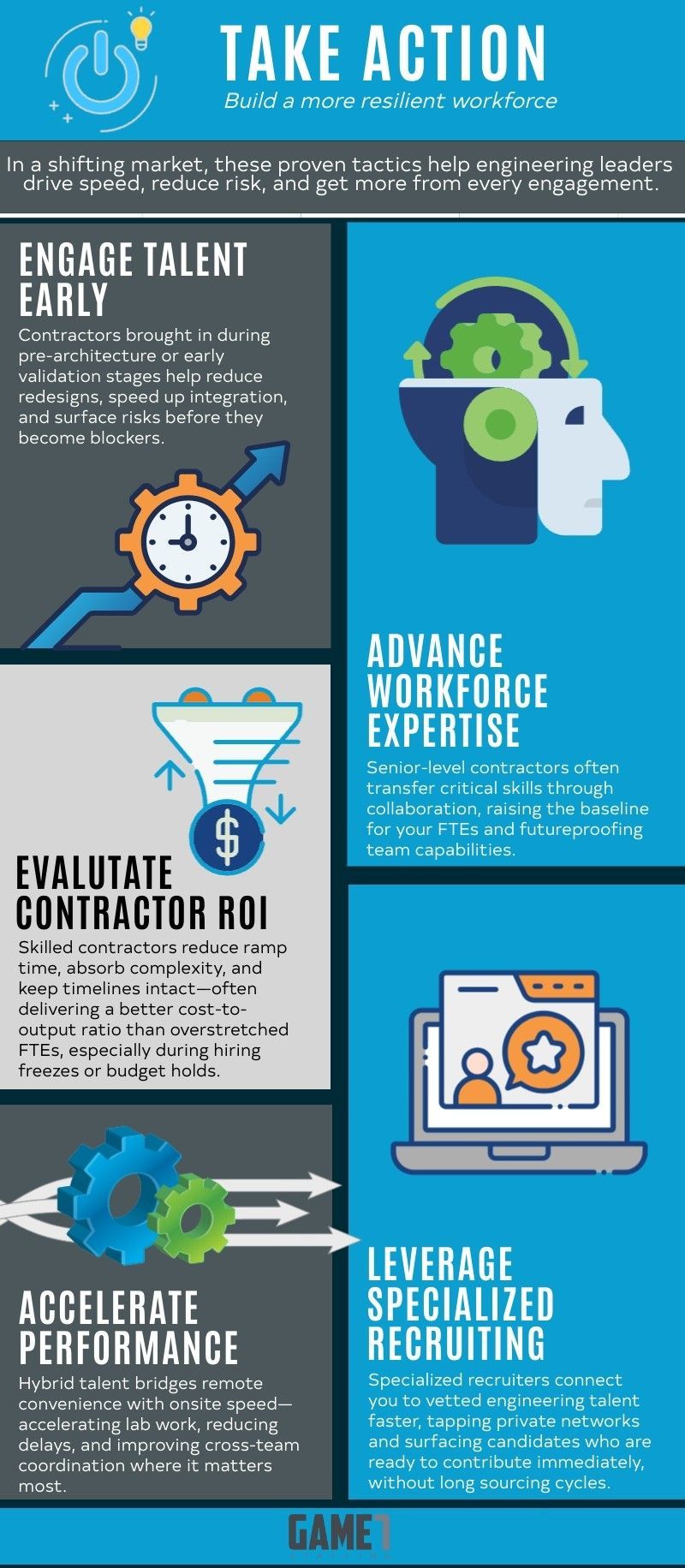Turning Uncertainty Into Impact
How Engineering Leaders Can Leverage Contract Talent to Drive Performance
As tariffs rise, AI accelerates, and supply chains shift, semiconductor companies are navigating yet another market pivot. Full-time hiring may be slowing, but project expectations aren’t. The result? A growing gap between roadmap demands and internal bandwidth.
That’s where contract engineers come in—not as stopgaps, but as strategic assets. When engaged early and used flexibly, experienced contractors bring immediate impact, faster integration, and built-in adaptability. Here’s how smart teams are leveraging contract talent to stay competitive, hit milestones, and scale with confidence.
🕒 Slower Production ≠ Slower Progress
Project cycles are stretching. Internal headcount remains flat. And yet product timelines—especially in AI, automotive, and defense—keep accelerating.
This creates a performance paradox: how do you deliver more with less?
Forward-thinking teams are answering with extended contracts, scope-flexible engineers, and specialized contributors who shorten ramp-up time and absorb new responsibilities midstream. According to Deloitte, companies that use contractors strategically can reduce total cost per deliverable by up to 25% and accelerate output by 35% source.
Pro Insight: If your internal team is experiencing scope creep, it may be time to renegotiate contracts, add phased extensions, or bring in fractional support with specialized skills.
🎯 Deep Expertise = Lower Risk + Faster Velocity
In complex systems development—especially in ASIC verification, DFT, emulation, and physical design—contractors aren’t just filling roles. They’re reducing risk and accelerating delivery.
McKinsey reports that semiconductor teams leveraging expert contractors improve development speed by up to 40% and reduce rework by as much as 30% source.
That’s because these engineers:
- Require minimal onboarding
- Anticipate cross-stage failure points
- Keep debug cycles tight and predictable
The value multiplies with hybrid engineers who understand hardware and embedded software. These individuals help reduce handoffs, bridge silos, and align firmware-silicon integration early—where missteps are most expensive.
🔁 Flexibility Pays—For Both Sides
Flexibility isn’t just a hiring preference—it’s a strategic advantage. As remote-only requests decline, the most in-demand contract engineers are those willing to meet teams in the middle.
- Onsite for bring-up, debug, or lab validation?
- Hybrid for critical cross-functional sprints?
- Remote with occasional travel?
Clients are prioritizing candidates who solve for access and speed, not just schedule.
And in return, high-value engineers are expecting clients to show flexibility too—whether it’s in scope, rate, or project structure. The best results come from partnerships that work both ways.
🚀 Strategic Contractors, Tangible ROI
The right contractor doesn’t just plug a gap—they reduce friction, compress timelines, and make internal teams better.
Why top engineering managers are increasing contractor usage:
- Stability during hiring freezes or delayed FTE backfills
- Fresh perspectives that unlock stalled design stages
- Scalable bandwidth aligned to tape-outs, pivots, and market fluctuations
According to Deloitte, semiconductor companies that adopt agile talent strategies outperform peers in both speed and output—delivering innovation on tighter budgets and compressed timelines.
👀 Visibility Beats the VMS Black Hole
The best contractors rarely make it to generic job boards or VMS pipelines. By the time internal processes are ready, they’re already placed elsewhere.
Hiring managers who build direct relationships with specialized recruiting partners gain a major advantage:
- Early access to pre-vetted, niche specialists
- Candidates aligned to specific tape-out cycles and milestone timelines
- Strategic consulting on how to structure flexible engagements that attract top-tier talent

Ready to move faster with less risk?
- 🔍 Explore our Specializations Map to see in-demand engineering areas
- 🤝 Meet our Consultants and request project-aligned talent
- 📩 Reach out to discuss available candidates and market trends for your vertical
We’re here to help you build smarter—not just fill roles.



